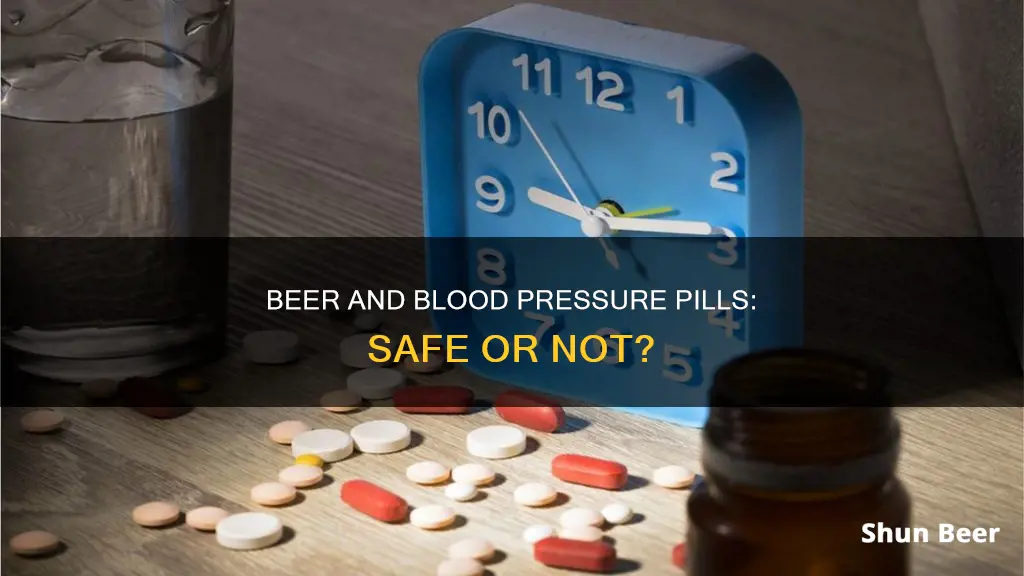
Drinking alcohol while taking blood pressure medication is not recommended, as it can lead to a range of side effects and health complications. Alcohol can cause an initial decrease in blood pressure, followed by an increase after 12 hours, and may also affect how the body processes these medications. This can lead to dizziness, drowsiness, fainting, and a fast heart rate.
The combination of alcohol and blood pressure medication can also increase the risk of serious health consequences, such as cardiovascular events, especially during the initial phase of treatment. Furthermore, excessive alcohol consumption can damage the liver, where many blood pressure medications are processed, potentially leading to increased liver toxicity.
Therefore, it is generally advised to avoid or limit alcohol consumption while taking blood pressure medication. It is important to consult a healthcare professional for advice tailored to your specific medical history and other medications.
| Characteristics | Values |
|---|---|
| --- | --- |
| Effects of drinking beer on people with high blood pressure | Drinking beer can raise blood pressure. |
| Effects of drinking beer on people taking blood pressure pills | Drinking beer can cause side effects such as dizziness, a fast heart rate, fainting, drowsiness, low blood pressure, or a dangerous fall or injury. |
| Recommended amount of beer to drink per day | For men, it is recommended to drink no more than two beers per day, and for women, it is recommended to drink no more than one beer per day. |
| Effects of drinking beer on people taking amlodipine | Drinking beer can increase the risk of side effects such as lightheadedness, dizziness, low blood pressure, or decreased effectiveness of amlodipine. |
What You'll Learn
- Amlodipine and alcohol can both lower blood pressure, increasing the risk of side effects such as dizziness and fainting
- Excessive alcohol consumption while taking amlodipine may lead to serious health consequences like cardiovascular events
- Drinking alcohol with blood pressure medication may lead to increased dizziness and lightheadedness
- Alcohol can cause an initial decrease in blood pressure, followed by an increase 12 hours after consumption
- Long-term alcohol abuse and a high dosage of amlodipine may increase the risk of adverse effects such as trouble sleeping, depression, anxiety, or sexual dysfunction

Amlodipine and alcohol can both lower blood pressure, increasing the risk of side effects such as dizziness and fainting
Amlodipine is a commonly prescribed antihypertensive or blood pressure medication. It belongs to a group of drugs known as calcium channel blockers, which also includes diltiazem and verapamil. These drugs work by relaxing the blood vessels, thereby lowering blood pressure. While amlodipine is typically taken as a daily oral tablet, it is important to note that it is heavily processed in the liver, which can be affected by alcohol consumption.
When it comes to combining amlodipine and alcohol, caution is advised due to the potential for negative interactions and increased side effects. Both amlodipine and alcohol can lower blood pressure, and consuming them together may lead to additive effects in reducing blood pressure. This can result in unpleasant and potentially dangerous side effects such as dizziness, lightheadedness, and fainting. These side effects are more likely to occur at the beginning of treatment, following a dose change, or when treatment is restarted after an interruption.
It is crucial to be aware of the potential risks and take necessary precautions. If you experience any side effects, it is important to inform your doctor, especially if they persist or become troublesome. Driving or operating hazardous machinery should be avoided until you understand how the medications affect you. Additionally, use caution when changing positions, such as getting up from a sitting or lying position, as orthostatic hypotension (low blood pressure when changing positions) can occur.
The interaction between amlodipine and alcohol can also impact the liver. Excessive alcohol consumption can damage the liver, and combining it with amlodipine may increase the risk of liver toxicity. This is especially important for individuals with existing liver conditions. Therefore, it is generally recommended to avoid or limit alcohol consumption while taking amlodipine, and consulting with a healthcare provider is essential for personalized advice based on an individual's medical history and other medications.
Beer Drinking and Liver Cirrhosis: What's the Link?
You may want to see also

Excessive alcohol consumption while taking amlodipine may lead to serious health consequences like cardiovascular events
When it comes to drinking alcohol while taking amlodipine, it is generally recommended to avoid or limit alcohol consumption. Alcohol can affect blood pressure and heart rate, and mixing it with amlodipine can increase the risk of side effects such as dizziness, lightheadedness, low blood pressure, and decreased effectiveness of the medication. These side effects may be more severe and more likely to occur when combined with alcohol.
Excessive alcohol consumption while taking amlodipine can lead to serious health risks. Firstly, alcohol can damage the liver, where amlodipine is processed, potentially leading to increased liver toxicity or exacerbating existing liver conditions. This combination may also increase the risk of cardiovascular events, especially during the initial phase of treatment. Additionally, long-term alcohol abuse and high dosages of amlodipine may increase the risk of adverse effects such as sleep disturbances, depression, anxiety, or sexual dysfunction.
It is important to note that the occurrence and severity of side effects depend on several factors, including the dosage of amlodipine, the amount of alcohol consumed, and the timing of consumption in relation to taking the medication. People with alcohol abuse disorders or those who binge drink may be at a higher risk of severe complications.
To ensure safety, it is recommended to consult a healthcare provider for tailored advice based on an individual's medical history and other medications. In most cases, it is advisable to avoid or limit alcohol consumption while taking amlodipine to minimise potential health risks.
Can You Lose Your Beer Belly? Stop Drinking to Find Out!
You may want to see also

Drinking alcohol with blood pressure medication may lead to increased dizziness and lightheadedness
Drinking alcohol while taking blood pressure medication can be dangerous, and it is generally recommended to avoid mixing the two. Alcohol can cause an increase or decrease in blood pressure, which may lead to increased dizziness and lightheadedness when combined with blood pressure medication.
The combination of alcohol and blood pressure medication can also result in an increased risk of other side effects, such as flushing of the skin, fast heartbeat, high blood sugar levels, and heart rhythm problems. In addition, excessive alcohol consumption can damage the liver, where many blood pressure medications are processed, potentially leading to increased liver toxicity.
The effects of mixing alcohol with blood pressure medications may vary depending on the type of medication, the amount of alcohol consumed, and individual health factors. It is always recommended to consult a healthcare professional before consuming alcohol while taking any medication, especially if you have a history of heart problems or other medical conditions. They can advise you on the specific risks and precautions based on your unique medical history.
Light Beer: Friend or Foe of Your Diet?
You may want to see also

Alcohol can cause an initial decrease in blood pressure, followed by an increase 12 hours after consumption
Alcohol can have a significant impact on blood pressure, especially when combined with blood pressure medication. It is important to understand the effects of alcohol on blood pressure to make informed decisions about alcohol consumption, particularly for individuals with hypertension or those taking blood pressure medication.
When consumed in moderate amounts, alcohol can lead to a decrease in blood pressure within the first six hours. This effect can last up to 12 hours after drinking, after which blood pressure starts to increase. The decrease in blood pressure is more pronounced with higher doses of alcohol. However, excessive alcohol consumption is considered one of the most common causes of raised blood pressure and can lead to hypertension.
The initial drop in blood pressure can be attributed to the vasodilatory effects of alcohol, which cause blood vessels to dilate, resulting in lower blood pressure. Additionally, alcohol can affect the renin-angiotensin-aldosterone system, leading to increased fluid retention and elevated blood pressure.
Mixing alcohol with certain blood pressure medications can lead to orthostatic hypotension, characterised by low blood pressure when standing up from a sitting or lying down position. This can increase the risk of dizziness, lightheadedness, fainting, and falls, especially in older individuals.
It is essential to consult a healthcare provider when taking blood pressure medication to understand the potential interactions with alcohol and make informed decisions about alcohol consumption. The effects of alcohol on blood pressure are complex and vary based on individual factors. Therefore, it is crucial to seek personalised advice from a healthcare professional.
Beer Steins: Safe Drinking or Health Hazard?
You may want to see also

Long-term alcohol abuse and a high dosage of amlodipine may increase the risk of adverse effects such as trouble sleeping, depression, anxiety, or sexual dysfunction
Alcohol abuse and blood pressure pills, such as amlodipine, are not a good combination. Amlodipine is a high blood pressure medication that works by relaxing the blood vessels to lower blood pressure. It is part of a group of drugs called calcium channel blockers.
Mixing amlodipine and alcohol can increase the risk of side effects such as lightheadedness, dizziness, low blood pressure, or decreased effectiveness of amlodipine. Excessive alcohol consumption while taking amlodipine may lead to serious health consequences like cardiovascular events, especially during the initial phase of treatment. Alcohol can cause an increase or decrease in blood pressure, and drinking it while taking amlodipine can lead to low blood pressure.
It is important to note that the side effects of mixing alcohol and amlodipine may vary depending on factors such as the dosage of amlodipine, the amount of alcohol consumed, and individual health conditions. People with alcohol abuse disorders or those who binge drink are at a higher risk of severe complications.
If you are taking amlodipine, it is generally recommended to avoid or limit alcohol consumption. Consult your healthcare provider for advice tailored to your specific medical history and other medications.
Beer's Impact: Thinning Blood and Health Effects
You may want to see also
Frequently asked questions
It is generally not recommended to mix alcohol with blood pressure medication. Drinking alcohol while taking blood pressure pills can cause an initial decrease in blood pressure followed by an increase after 12 hours, and may lead to side effects such as dizziness, drowsiness, and fainting.
Side effects of drinking alcohol while taking blood pressure pills include dizziness, drowsiness, fainting, low blood pressure, and a fast heart rate. In addition, drinking alcohol may decrease the effectiveness of your blood pressure medication.
It is not recommended to mix alcohol with ACE inhibitors such as lisinopril and enalapril, angiotensin receptor blockers (ARBs) such as valsartan and losartan, beta-blockers, diuretics, or calcium channel blockers such as amlodipine and verapamil.







